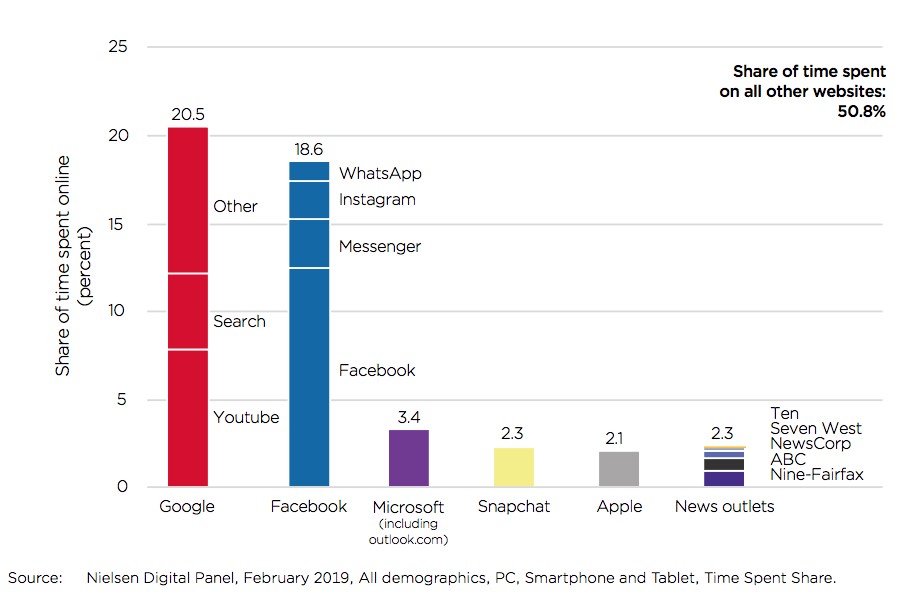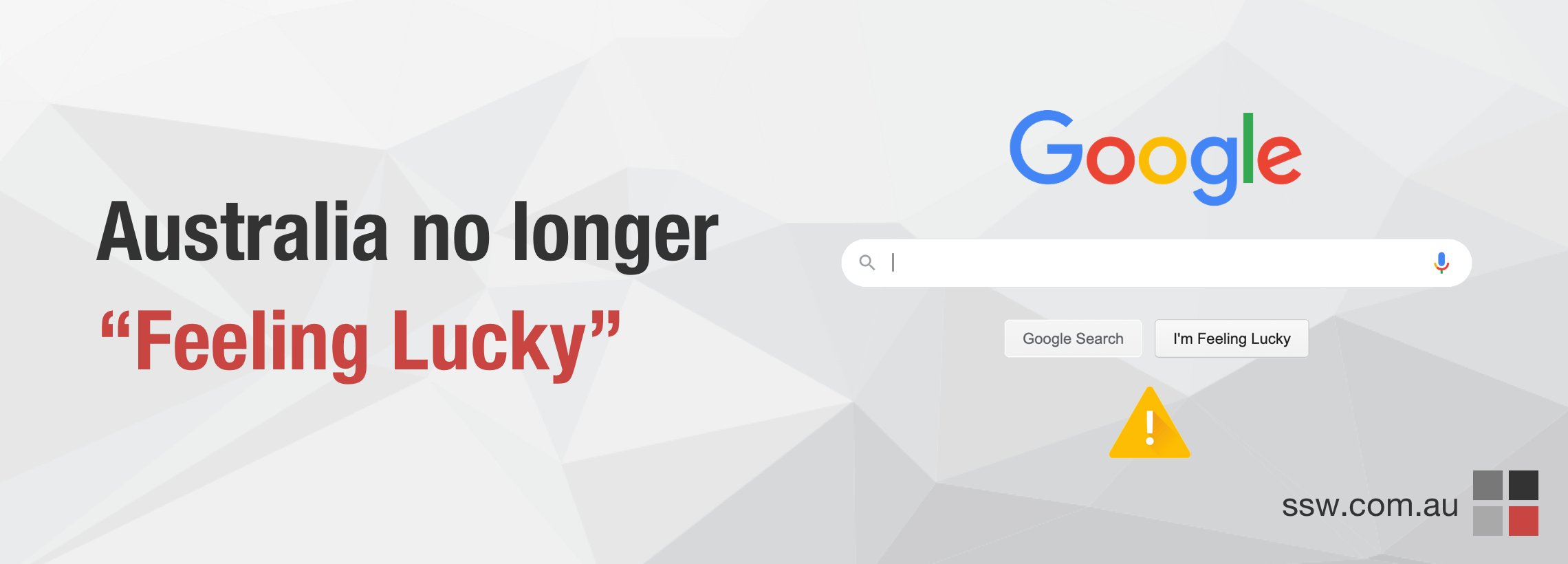Google Search – Australia no longer “Feeling Lucky”
Aussies using Google have noticed they are caught in the middle of a recent conflict between Google, and the Australian Government over the newly proposed News Media Bargaining Code.
Aussies have a dependency on Google
93% of our online experiences begin with search engines. According to The Australian Bureau of Statistics, Google is by far the most used search engine in Australia. As of May 2019, they hold a market share of 95%, followed by Bing with 3.5% and DuckDuckGo with 0.5%.
There are around 19 million adults in Australia (over the age of 15) and Google and Facebook make up the lion’s share of our time online:
- 19 million Australians use Google Search (basically everyone);
- 17 million Australians watch YouTube (owned by Google);
- 17 million Australians access Facebook;
- 11 million Australians access Instagram (owned by Facebook).

(Source: ACCC Digital Platform Inquiry)
It is no wonder then, that Australians like myself have been getting a little nervous about seeing this ominous warning on every Google search;
“Warning your ability to search is at risk from new regulations”.
What the hell is the Australian Government doing?
The Australian Competition & Consumer Commission (ACCC) is seeking to address what they see as a power imbalance between Australian news media and Google and Facebook and likely other major digital platforms. The Govt say this imbalance has led to news media businesses living with a very small percentage of the ad revenue.

Google give Aussies a scary open letter
The Govt have openly criticised Google for what they see as misleading information in their Open Letter to Australians. Australian media organisations have also largely dismissed Google’s warnings as simply an unethical scare-tactic, but unsurprisingly given the conflict of interest in who’s reporting this, the situation is a lot more complex.

https://about.google/intl/ALL_au/google-in-australia/an-open-letter/
Google’s not happy
The Govt published the proposed government regulations to “allow news media businesses to bargain individually or collectively with Google and Facebook over payment for the inclusion of news on their services.” This would mean that Google could be forced into agreements with the news media if they are unable to reach an agreement via mediation.
What most people don’t know, is that it was drafted by News Corporation Australia, whose owner Rupert Murdoch has been pushing for these changes for a long time. Google is concerned and and a fair percentage of the Australian public is also concerned because:
- Search data – under this law, Google has to tell news media businesses ‘how they can gain access’ to data about the use of their products.
- Free services – the law offers no protection against unreasonable payment demands from Australian media giants. Which could mean Australians end up paying for services that are currently free.
- Spam – Google currently changes their secret algorithms that help everyday users avoid useless spam sites several times a day. Under the new laws, they would have to give news business 28 days warning for all changes to the algorithm. This could seriously affect the functionality of search if Google cannot make updates regularly. The suggested 28-day notice for algorithm demands sounds to be impossible to implement as Google updates its algorithm more than 3,600 times a year to combat spam. Obviously it wouldn’t be possible to notify everyone with enough time to implement changes quickly.
- Unfair advantage – news businesses would be given advanced knowledge of any algorithm changes. This would mean that they have an unfair advantage over businesses and individuals who would not receive this information.
- Censorship – Google & Facebook would need to provide greater user comment moderation tools. This would allow media businesses to remove or filter user comments, disable user comments, and block user comments or accounts. This one obviously could be used for evil.
What’s in it for Google?
Google and Facebook don’t really make any money off news content – there are no ads in Google News. Last year Google platforms provided *3 billion* clicks to Australian publishers alone. Yet they are seen as the ones taking money from the Australian Media. The Australian media has been monetising these clicks; however it’s nowhere near what they would have made from advertising in the past. The government legislation appears to be compensating for a shift in the industry or a failure to innovate.
Would journalists benefit?
This proposed legislation is aimed at helping news media business who predominantly produce ‘core news’. They also need to adhere to appropriate professional editorial standards, maintain editorial independence and operate primarily in Australia for Australian audiences.
However, here is where things get interesting. It is hard for the Govt to argue that it aims to protect all news media businesses and that it’s not just advocating for magnates like Rupert Murdoch when firstly, the code was drafted by News Corporation Australia and secondly, the code stipulates that new media businesses must nominate sources that:
- Earn more than $150,000 in the last financial year, or at least 3 of the last 5 (this is not going to help up and coming, innovative, young journalists)
- Once the news business is eligible to participate, it can take money from Google and Facebook for anything. This includes sports journalism, or reporting about the entertainment industry. A significant loophole, unless you think core news is about who won the footie match, or whether Kylie’s wearing hot-pants.
Conclusion
Journalists need to be paid to produce good content, and the Australian news media needs to be protected from exploitation of their services. However this new Aussie legislation seems to lack a basic understanding of how tech businesses work. The legislation also seems to be unjustly favouring media companies, and seems to lack a basic understanding of how equity works on the internet. There are some clear problems with this legislation, which will hopefully come out during the next stage of negotiations.
Either Google and Facebook are not going to agree to any of this, and walk away so they don’t set a precedent for other countries (leaving Aussies as collateral damage),
or they’re going to agree to giving media companies a small slice of their ad revenue which could be seen the lessor of two evils.
What’s your prediction?

September 8, 2020 @ 2:27 AM
Govt should be supporting innovation in Australia rather than propping up outdated legacy media.
News Corp should be innovating instead of crying to govt about not making money.
Fact is in 2020 we don’t need billion-dollar media companies feeding us information – thanks to the internet all it takes to be a journalist is a laptop and some opinions/information, and fundamental media business models need to adapt to the new paradigm.
Next up the big horse lobby will be asking for govt subsidised stables in every town.
September 8, 2020 @ 6:06 AM
Well something has to be done.
I don’t think the way these tech companies work is actually working at all. Across the world there’s a crisis in journalistic standards, as media organisations have been decimated by big tech’s business model i.e to take content, give nothing for it in return.
Companies like Google, Facebook and Twitter are increasingly being asked to do fact checking and ensuring that the material they are publishing meets what was formerly known as journalistic standards and this is because no one else is doing it. These tech companies lack the resources, the experience and the desire to do the work that journalists use to do, which has resulted in a period in which society itself seems to be in regression, climate change skeptics, “fake news”, populist politics, people tearing down 5G towers, BIll Gates is the mastermind behind Corona virus… a wild fire of stupidity. The internet at the moment seems to be making us all dumber. If Google, Facebook and Twitter can’t do better, they better start paying someone who can.
September 10, 2020 @ 12:10 PM
Interesting analysis. I wouldn’t be surprised if the current Murdoch government (no, I didn’t spell Morrison wrong) passes this law, and Google and Facebook follow through and the rest of us suffer the diminishing value of the internet. Maybe once the dinosaurs die off and retire, Australia will return to a forward thinking mentality. Let’s just hope it’s not too late for us to catch up.
You can look at it as a symptom of a broader problem here in Australia – namely, that the last generation of mega-successful entrepreneurs (e.g. the entertainment, news media and retail giants) feel that they can use their clout to stymie progress and innovation at the expense of the Australian consumer. And, worse, prevent Aussies from accessing better products and services at better prices, just so that these moguls can protect their domains and cashpiles, rather than innovating and keeping up with the rest of the world.
And that’s really where the long term damage comes. Australia doesn’t have a particularly strong spirit of innovation at the moment. In fact, for a country that used to be pioneering (we were one of the first to ban incandescent lightbulbs, back in 2009, for example), we’ve reverted to a country of regressive people becoming more and more hardline conservative. And, political views aside, this is hurting us as a country. As the rest of the world embraces innovation and develops, and adopts, the technology of the future, we’re willingly leaving ourselves behind.
While I find it hard to feel sorry for either side in this Goliath vs Goliath match, it’s a shame that Aussies will be caught in the middle.
September 12, 2020 @ 12:36 AM
The proposed law is asking Google to pay for sending traffic to news sites. This is ridiculous: web sites pay to receive traffic, not the other way round!
If the LNP wants to rein in Google and Facebook, how about getting them to pay their fair share of tax, instead of trying to transfer a share of their revenue to their mate Rupert Murdoch.